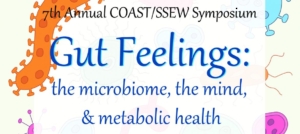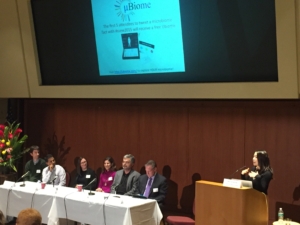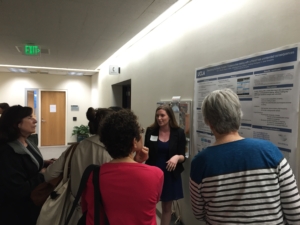Gut Feelings: Erin’s Experience at #SSEW2015
Last week, I had the opportunity to attend the COAST/SSEW (Sugar, Stress, Environment, and Weight) Annual Symposium at UCSF with Dr. T. The theme of the symposium was “Gut Feelings: The microbiome, the mind, and metabolic health”, so all of the speakers were leading researchers and policymakers in the field of microbiome research. Before attending the symposium, all that I knew about the microbiome (basically, the array of bacteria that live in your intestines) was that certain profiles of microbiota have been linked to obesity.
The speakers at the symposium touched on the microbiome-obesity connection, but they also spoke about aspects of the microbiome that I had never thought about, such as the connection between the microbiome, the brain, and the immune system, as well as the relationship between nutrition and the microbiome. Before hearing the talks, I didn’t fully appreciate how influential to our health the microbiome can be. However, I quickly learned that the human body contains approximately 10 trillion human cells, and about 100 trillion microbial cells – meaning that technically, we are only 10% human. Pretty shocking. I also learned about some fascinating new techniques for evaluating the microbiome, as well as about strategies to cultivate the healthiest microbiome possible (hint, hint: eat lots of fish and vegetables). I was even surprised to learn that seemingly small aspects of early childhood development – such as being born vaginally vs. via C-section, or having a dog in your home as a child – can have major implications for one’s microbiome health and allergen sensitivity later in life! All in all, the symposium left me in awe of the power that our gut microbiome can have on our health, as well as on our emotional responses and brain development.
At the end of the day, Dr. T moderated a panel of all of the speakers, which allowed attendees to ask any burning questions and to get a few final take-home messages. Essentially, we learned that small changes to our environments in early childhood and in our diets throughout life can have large implications for the makeup of our microbiome, and that our microbiome can affect a wide range of human functions, such as immune responses, brain development, pain sensitivity, emotional responses, and weight regulation.
Dr. T. moderating the panel of speakers at the end of the day.
After the panel, the symposium allowed time for a poster session, during which time I presented a poster called “Debunking the Buddy System: Evidence that dieting with a friend may exacerbate negative consequences”. The poster was based on the findings from DiSH Lab grad student Angela Incollingo Rodriguez’s “Roommate Dieting Study”, which I worked as an RA on for over a year. It was really exciting to get to share our findings with graduate students, postdoctoral fellows, and faculty members at the symposium, especially because lots of people expressed interest in the study. Though I was nervous at first to discuss the poster (as one of the only undergraduates at the symposium), it ended up going quite well!
Here’s a photo of me presenting my poster after the symposium.
I’m so grateful that I was able to attend the COAST/SSEW Symposium with Dr. T., and that I was able to present at the poster session – getting to speak with so many successful researchers in the field of health psychology and the microbiome made me even more driven to continue working to answer my own research questions!



